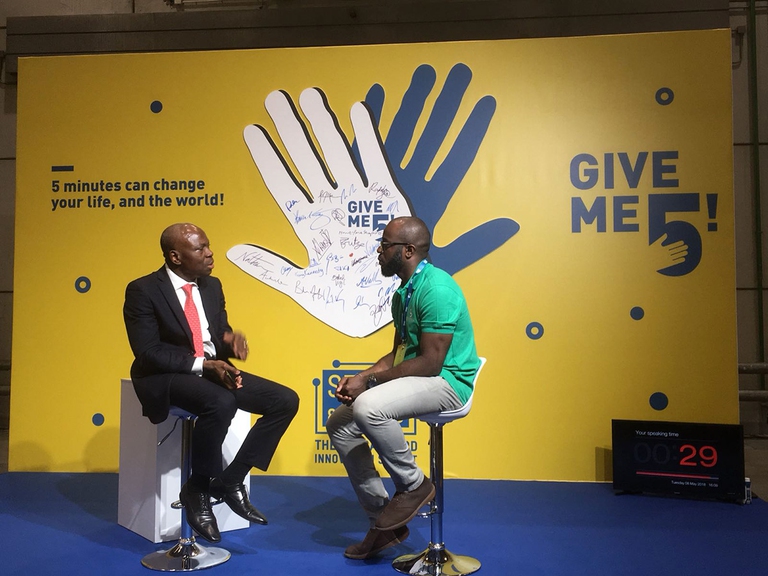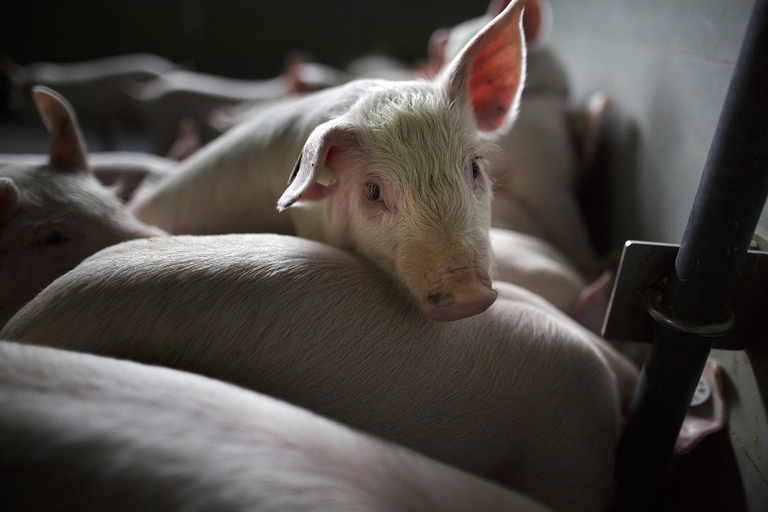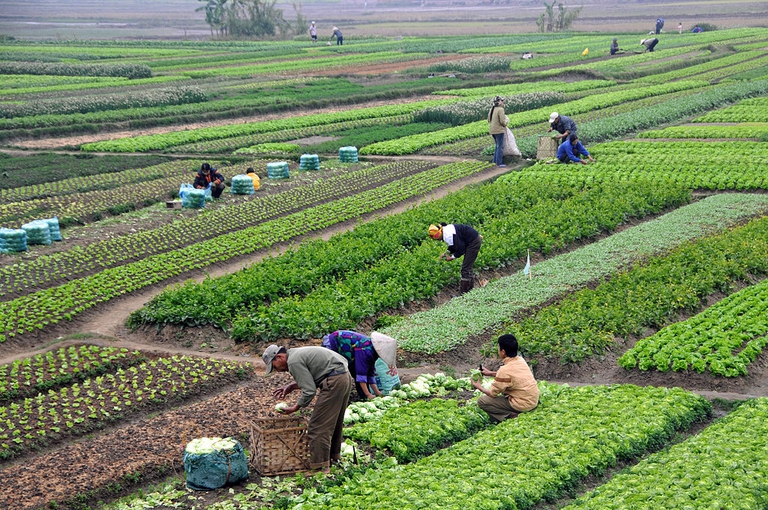
She healed completely by becoming vegan over 25 years ago following an accident that cost her her leg. We met Heather Mills at Seeds&Chips, where she told us about her pioneering food company VBites.
Despite the world population keeps growing, nobody should be left behind. To do so we need a transformation and services, like the internet. IFAD President Gilbert Houngbo tells his vision to support small famers and the communities they belong to.
“It’s not about what’s possible, but what’s fair”. This is what scientific journalist Charles Mann wrote in his book The wizard and the prophet, a text that examines an important issue – how to feed an ever growing population in the face of an overexploited Planet. The data of the United Nations Department of Economic and Social Affairs (UNDESA), in fact, shows that the world population is expected to hit 10 billion people in 2050.
Read also: How many people will inhabit the world in 2030, 2050 and 2100
We asked this question – how does the agriculture system has to change in order to meet the needs of social and environmental sustainability – to Gilbert Houngbo, president of IFAD (International Fund for Agricultural Development) and former Prime Minister of Togo (2008-2012).
Houngbo spent more than 30 years trying to improve the lives of the most vulnerable people in his country before being called to lead the agency of the United Nations whose aim is to improve member countries’ agricultural activities and results.
“Innovation is key if we want to engage youth”#IFAD President @GHoungbo gives advice to young agri-entrepreneurs at @SEEDSandCHIPS in Milan.#SaC18 #youth #agriculture #innovation pic.twitter.com/vhyEPfbuEQ
— IFAD (@IFADnews) 10 May 2018
We met him in occasion of Seeds&Chips, the international summit on food and innovation held in Milan in May 2018. Thanks to Houngbo we tried to understand why governments – after having pushed the rural population to move to urban areas for years to automate the industry – now encourage repopulating rural areas in an attempt to face a food demand that is relentlessly increasing.
Read also: How agriculture and climate change are related: causes and effects
Do you think agroecology can be the right way to overcome the current intensive model based on the overexploitation of resources? In this sense, is it sustainable also in terms of production?
This is a very good question and also a tricky one. First of all, we must know all the risks we are incurring if we don’t act against climate change today. The environment and climate change have become part of the DNA of agricultural production systems. So what we are trying to do now is to look at the constraint climate change is causing to us and how we can turn that into an opportunity, in terms of investments and business opportunities as well.
And this is where the debate on whether agroecology should be an alternative to the current intensive production fits into. I think we first have to agree on what we consider intensive. Take Africa for example. We know that on an annual basis Africa still imports 35 billion food products. It’s very hard for me to say this is too intensive. However, there are countries, mostly industrialised, where 30 or 40 per cent of the production is lost. I would agree that we could look at this as an intensive exploitation. However intensive or not, being climate smart in agriculture for me is a must. If there’s a way to respect the environment and not overuse the land while maximising the productivity based on the demands, this is the right way.
What role do small farmers play and how big companies need to change in order to respect the soil?
I believe there’s a good matching complementarity between the small holders and commercial farms. What I believe is important is that small holders need to become more competitive. By competitive I don’t just mean for small holders to increase productivity to compete with large companies, but also amongst themselves. Consumers will always look for higher quality at a cheaper price, this is human nature. Therefore, it is important to consider being more competitive by introducing technology and innovation in farming. Sometimes small holders manage to increase their income and their livelihood, and some of the big commercial food systems become a market for them, where they can sell their products for the processing. Usually big commercial farms have different types of markets as well. I know this is up for debate, of course there is a grey area we must recognise, but I do not believe this is either or, there is a complementarity. For us in Ifad it is quite important to bring the small holders to be much more business like, similarly to the private sector outside of agriculture. SMEs, for example, create jobs but it doesn’t mean that you have to do away with the big conglomerates, it’s the same in agriculture as I see it.
Ever more young people are willing to go back to the soil – at least in industrialised countries. In contrast, people in developing countries see cities as the only way to achieve their own development. What is the relationship between the soil and young generations entering the labour market?
When I deliver a speech I often start by asking how many people in the room are willing to go back to rural areas. And I’m always afraid that there would be very few hands raised. That’s because we do have a situation where agriculture is not that attractive or isn’t any more. Yet some people would voluntarily prefer to settle, from a large city to rural areas. This is why I’m advocating that our fight for the betterment and improvement of the rural population has to go beyond just agricultural production, I’m talking about rural transformation.
Is this a transformation that also passes through the introduction of basic services?
Yes, I’m talking about introducing basic services and improving the existing ones: better healthcare, better education, better water sanitation and security, from the access to malaria treatment to close and accessible schools for kids. I’m not asking for luxury, it’s about equality. Mostly in rural areas happiness isn’t only measured in terms of financial means. So by having basic services it would be natural for people to stay in rural areas. Another example is communication. If I knew that in cities people communicate easily on Whatsapp and I can’t because I have no access at all to a network, I would be tempted to go back to the city. Everyone wants and needs to communicate. So basic access to internet, which means even just 2 or 3 hours a day, should be considered an essential service nowadays. It’s not just the social dimension. It’s also supporting the youth in creating cooperation and organizations, through which they can have access to microfinance or have financial credit available. So in a nutshell I do believe a rural transformation has to be part of the equation.
How is Ifad communicating with the private and public sectors in order to facilitate this transformation?
IFAD works with both. We provide interest-free loans to governments in low income countries and very low-interest in other countries. By the same token, we work with the private sector and other actors including the regional development banks or other realities to scale up what we are doing, in order to be sure that when we invest 1 it becomes 3, and 3 becomes 6. Another thing we do with the private sector is education, like we did in Indonesia with local producers, hoping they will able to bring expertise to the rural areas. We’ve also recently created the Agri Business Capital Funds (ABC), in order to provide loans directly to the youth with technical assistance facilities to help them have bankable projects and finance them, in addition to the loans we give to governments. These funds are used for communities, this has to be very very clear, and 51 per cent of our beneficiaries are women.
How is IFAD helping to protect biodiversity and fight climate change?
The Paris Agreement was signed in December 2015, IFAD had already launched the ASAP project (Adaptation for Smallholder Agricultural Programme) already in 2012, which helped agricultural activities face climate change. A lot of our donor countries quickly helped us mobilise 300 million dollars. It was so successful that we’ve just launched ASAP2. Part of our commitment is to involve young people in our loans and in the project we’re going to finance while integrating issues like gender equality, nutrition and climate change. These are our pillars.
Siamo anche su WhatsApp. Segui il canale ufficiale LifeGate per restare aggiornata, aggiornato sulle ultime notizie e sulle nostre attività.
![]()
Quest'opera è distribuita con Licenza Creative Commons Attribuzione - Non commerciale - Non opere derivate 4.0 Internazionale.
She healed completely by becoming vegan over 25 years ago following an accident that cost her her leg. We met Heather Mills at Seeds&Chips, where she told us about her pioneering food company VBites.
Princess Viktória de Bourbon de Parme, patron of Save The Children Netherlands, aims to make a difference in children’s lives. And to achieve big results, she’s counting on small farmers.
It’s all about telling the right stories. Danielle Nierenberg, founder of the think tank Food Tank, travels the world meeting people who are revolutionising the food system. In this interview she shares some of these eye-opening experiences.
Factory farming conditions and antibiotic-resistant pathogens emerging as a result of them pose an existential threat to humans in the form of zoonotic diseases. Why it’s time to produce and consume food more thoughtfully.
The world of cinema recognises the link between food choices and the climate crisis by offering vegan menus for awards season events, including at the most important of them all: the Oscars.
Let’s look at the reasons behind the growth of veganism in India, as a small yet vocal section of the population turns towards this diet and lifestyle in the largest milk producing country in the world.
by Jeffrey Y. Campbell, Manager of the Forest and Farm Facility at FAO In the Ecuadorian Amazon, Kichwa farmers grow dozens of products on tiny parcels of land. Their lands hum with biodiversity, yielding nutritious foods that have sustained families for generations. Wandering among fruit and nut trees and crops, these indigenous agroforesters fill their baskets
Sam Kass has been close to the Obama family for over a decade, starting as their chef in 2005. His commitment to promoting healthy eating and a more sustainable food system – which causes fewer emissions and less deforestation, therefore contributing to climate change mitigation – has found a perfect fit with the former president’s and especially First Lady
Recovering a sustainable use of the soil is essential for our future, and that of biodiversity. During his Italian visit in occasion of the Seeds&Chips Global Food Innovation Summit in Milan we talked to Edward Mukiibi, Vice President at Slow Food International and Coordinator of Slow Food Uganda Activities. Mukiibi is an agronomist born and raised










